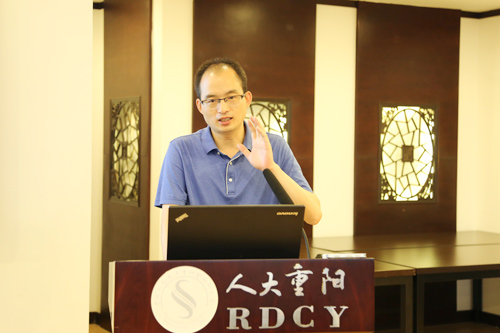Picture
Your Present Location: HOME> PictureLv Bingyang: Discussion and solution to the personal income tax reform
On the evening of June 25th, RDCY Seminar Series was held in Chongyang Institute for Financial Studies at Renmin University of China (RDCY). Lv Bingyang, professor of the School of Finance, doctoral supervisor and director of department of finance at Renmin University of China, delivered a speech themed “skills and difficulties in China’s personal income tax reform”. Although personal income tax currently accounts for only about 8% of China`s total tax revenue, the 2018 tax reform is of great significance for regulating income distribution, deepening tax reform, modernizing tax collection and management, and improving national governance. The tax reform is not only related to you and my “money bag”, but also has deep meaning to the society and the country.

Professor Lv emphasized that personal income tax reform has stirred the concerns of the whole society. The tax reform is not only an economic issue that endeavors to safeguard the tangible interests of the people; it is also an issue concerning about law, society and state governance.
Lv Bingyang analyzed the main points of the reform: Implementing a syndrome tax on part of the labor income; Optimizing the adjustment tax rate structure; Improving the basic cost reduction criteria for comprehensive income; Setting up a special additional deductions; Adding anti-tax avoidance clauses.
Professor Lv also talk about that the reform draft has triggered a large number of social disputes, mainly focusing on the following aspects. First, is it reasonable to set the exemption amount to 5000 yuan. What are the basis? Second, should the highest marginal tax rate still be maintained at 45%? Third, should we collect tax according to individual or family? Fourth, will the increase in housing loan interest and housing rent deduction have a great impact on the real estate market? Fifth, should we add other special deductions? For example, raising old people’s expenses. Sixth, should we consider regional differences? Seventh, from the perspective of the State Administration of Taxation, it concerns about the three “what to do” problems. First, what to do if the taxpayers do not declare? Second, what to do if the taxpayers` falsely declares? Third, what to do if the taxpayers choose not to pay after their declaration?
The original intention of this reform was to increase the role of personal income tax in adjusting income distribution. However, the adjustment effect of personal income tax on distribution was restricted by two innate factors, so that its role could not be fully exerted. First, there are fewer tax collecting groups. The effect of personal income tax on regulating income distribution depends on two points: first, tax progressiveness, and second, average tax rate. At present, the number of taxpayers in China is not too much. At least half of the farmers do not need to pay taxes. Second, it is difficult for a single tax to impose a syndrome on capital and to implement a progressive tax rate. According to China`s current situation, the share of labor distribution is in a downward trend, and the share of capital allocation is on an upward trend, which is in line with the trend of the world. Due to the two factors of personal income tax, the distribution of personal income tax adjustment is actually not as big as we think.
In summary, regarding the tax adjustment in income distribution, there can be concluded following rational understandings. First, it is difficult to reach a consensus on the reform, but there is a "consensus" that everyone believes that personal income tax can surely regulate income distribution. The scientific nature of this "consensus" needs to be analyzed in depth. Second, the world experience shows that using a tax to regulate income distribution is much less effective. Third, absolute fairness cannot be achieved. Reform can only find a balance between ideals and reality. Fourth, there are many financial instruments that affect income distribution, and their effects are mostly better than personal taxes, such as poverty reduction, social security expenditures, and education expenditures. Based on the above analysis, the role of personal tax reforms in regulating distribution is also limited.
The personal tax involves a fundamental issue of state and society relations. If the draft tax reform is finally passed, two urgent problems must be dealt with in the implementation of the tax. First, comprehensive governance. It includes the following measures: establishing a comprehensive tax code system; building the real-name registration system for personal assets; The implementation of the cash management system in order to prevent tax evasion; building a national network of tax-related information platforms. Second, we must give full play to local enthusiasm.
Finally, Professor Lv concluded in three judgments. First, the personal income tax reform is a move to awaken the taxpayer`s consciousness. Second, the tax reform has forced the tax collection and management mechanism to carry out huge reforms, thereby promoting the modernization of tax collection and management. Third, promoting the modernization of national governance capabilities.
Key Words: tax; reform; economics; Lv Bingyang























































































 京公网安备 11010802037854号
京公网安备 11010802037854号





